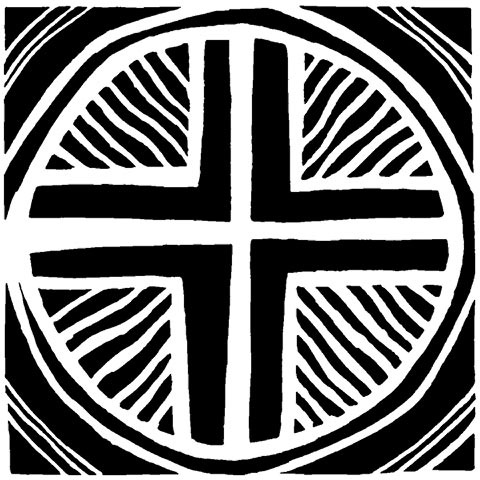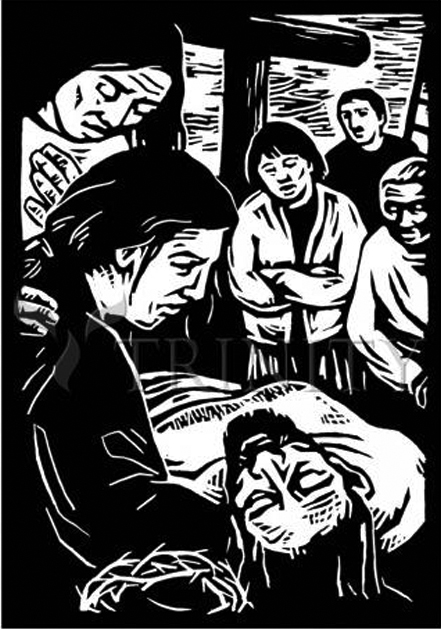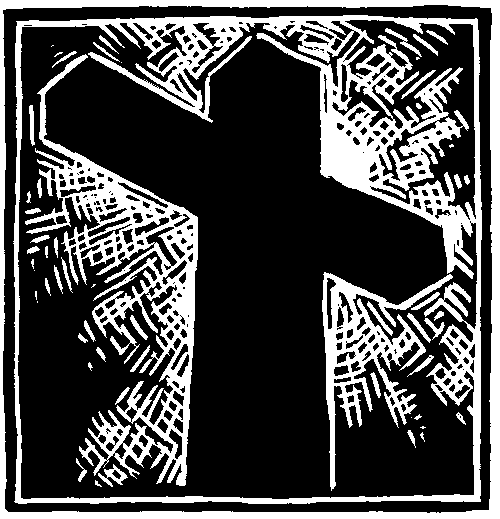by Ken Sehested
Maundy Thursday 2019
 The week beginning with Palm Sunday and ending with Easter Eve is arguably the most volatile and conflicted period on the liturgical calendar. Even the lectionary suggestions for Scripture readings gives the options of celebrating a coronation or lamenting a crucifixion. Do we give priority to the cross or the crown?
The week beginning with Palm Sunday and ending with Easter Eve is arguably the most volatile and conflicted period on the liturgical calendar. Even the lectionary suggestions for Scripture readings gives the options of celebrating a coronation or lamenting a crucifixion. Do we give priority to the cross or the crown?
§ § §
The Gospels’ accounts of Jesus’ “triumphal entry” into Jerusalem on Palm Sunday is filled with obvious references to religious-inspired revolutionary fervor. His choice of riding a donkey (instead of a stallion, the typical transport of royalty and military leaders) is, on the one hand, a form of satire on the nature of power. But it was also a form of theater linking his upside down kingship claim dating back to the sixth century BCE Prophet Zechariah, where God promises a donkey-mounted king who will “cut off the chariot . . . and the war horse from Jerusalem, and the battle bow shall be cut off, and he shall speak peace to the nations; his rule shall be from sea to sea . . . to the ends of the earth” (9:9-10).
We should remember that it was no coincidence that the Gospel writers chose words like “Lord,” “Savior,” “Son of God” and “Prince of Peace” to account Jesus’ birth narratives. These exact same terms were also used of the great Caesar Augustus, ruler of the Roman Empire during that period. These narratives are evidence of the serious ideological conflict between the contrasting visions pitting the Reign of God with the rulers of this world. [1]
§ § §
We know from many sources that Rome’s signature brand was to offer religious “freedom” to its conquered peoples, but only insomuch as these peoples’ piety remained silent on empire’s dominion.
Many inscriptions describing Caesar’s divine status can still be found. On some of those artifacts you can read  about the Caesar’s “gospel”—literally, euaggelia, the same root word in Greek we Christians use when we speak of evangelism.
about the Caesar’s “gospel”—literally, euaggelia, the same root word in Greek we Christians use when we speak of evangelism.
Jesus’ highly symbolic entrance into Jerusalem—the theological center of the biblical world—also fulfills the first century prophecy of the Hebrew priest, Zechariah, father of John the Baptizer, who on learning of Mary’s pregnancy, forecast the coming of Messiah and the global peace proclaimed by this humble prince, fulfilling the angels’ song in Luke 2:14: “Glory to God in the highest, And on earth peace, goodwill toward people!”
Glory, to God . . . and peace, for the earth, are inextricably bound. Heaven’s righteous insurgency unfolds as earth’s just ordering.
§ § §
Clearly, Jesus was linking his mission with the foundational Jewish memory of the Passover, marking their liberation from Pharaoh’s slave labor force centuries before. Passover was Washington’s Birthday, Memorial Day, Veterans’ Day, Flag Day, and Fourth of July all rolled into one. Rome dramatically increased its security forces during the season.
The shouts of “Hosanna” from the crowds gathered for this parade were not exclamations of pious sentiment. It wasn’t “hallelujah,” “praise the Lord,” or “amen!” Hosanna means in Hebrew, “Save us, we beseech you!” And the saving was not merely souls for heaven but the nation from colonial rule. “Hosanna” was holiness manifest in righteous governance.
Not long after Jesus’ crucifixion there arose in Israel a fanatical band of Zealots, the Sicarii, who carried out political assassinations against both Roman officials and Jewish Temple elite who collaborated with the occupiers, using daggers (sicae) which were easily concealed in cloaks, and perpetrators easily blended in with the throngs crowding Jerusalem’s streets.
The use of palm fronds lining the roadway is likely an intended reference to the second century BCE Israelite priest and rebel commander Judas Maccabeus, namesake of the revolt against the Seleucid (Hellenist) Empire’s control of Jerusalem and, especially, the cleansing of the Jewish Temple of Greek gods and goddesses portrayals. The coup was successful but short-lived.
§ § §
Jesus’ militant overturning of the Temple moneychangers’ tables was not an assault on financial transaction but on economic exploitation of the poor, an obvious recollection of the “jubilee” admonitions in Hebrew Scripture regarding sabbath practices that include the cancellation of debt, land redistribution, and freeing of slaves. The Temple porticos, where money changers charged exorbitant rates to exchange the many foreign pilgrims’ currency to Hebrew shekels (for purchasing sacrificial animals), were a form of hawking access to the holy. (Several decades  later, in the Jewish Revolt of 66, one of the first acts in the rebellion against Roman occupation was the burning of the debt records stored in the Temple archives.)
later, in the Jewish Revolt of 66, one of the first acts in the rebellion against Roman occupation was the burning of the debt records stored in the Temple archives.)
In other words, Jesus wasn’t lynched because he talked about getting right with God. He was executed in the most brutal way of that day, literally nailed to a tree—right alongside the highway, for all to see—a punishment for which the Roman authorities reserved for political subversives. Crucifixion was an important tactic in Rome’s “war on terror,” designed not so much to kill as to intimidate, dominate, and pacify.
Pax Christi, the peace of Christ, was (and sometimes still is) a threat to Pax Romana, the “peace” resulting from Roman tyranny.
§ § §
The believing community’s choice between marking Holy Week either as coronation or crucifixion has consistently bedeviled its theological vision and discipling presence. Coronators want to crown Jesus as Sovereign in order to put churchly authorities in charge of social order (directly, in some traditions; indirectly, in others). A focus on Jesus’ “passion” typically sets aside history from meaningful attention, turning the drama into a metaphysical transaction, isolating human affairs from the resurrection’s subversive implications.
In both cases, God comes out looking like a divine child abuser.
The import of Christianity’s premier season simply dissipates when stripped of its fleshly, corporeal context. Inasmuch as the church’s proclamation skips from Jesus’ crib to his cross to his crown of glory, the defining content of Jesus’s message—his instruction, his healing, his parables, his choice of companions, his preoccupation with the marginalized—become disposable. Then, what passes for church becomes a near-perpetual capital campaign to extend and adorn its sanctuaries—where nothing that troubles Herod is heard again. [2]
God is not a sadist requiring blood sacrifice to satisfy divine displeasure. Rather, God’s intention—in the incarnate presence of Jesus—intentionally disavows vengeance. [3] The crucifixion was not a premise in divine logic. Jesus’ execution was the conclusion of his seditious life. And it was an explicit repudiation of bloodlust as the enduring arbiter of creation’s order. The passion of Christ, to endure suffering rather than inflict retaliation, is the secret to the resurrection’s power to breach the seemingly insurmountable walls of hostility that have plagued the world ever since the abandonment of Eden.
This is God’s unilaterally disarming initiative. The Resurrected One’s emergence from the grip of death broadcasts, even today, God’s invitation to likewise walk this Way. [4] It is precisely the Way of the cross that leads home and empties tombs.
The failure to love enemies is to hedge on Jesus. We are, as the Apostle said, “baptized into Christ’s death,” implicated by the sedition of our own faithfulness. Thereby we also share in the resurrection and the promised new heaven and new earth, where every tear will be dried and death itself comes undone. [5]
# # #
 ENDNOTES
ENDNOTES
[1] Remember that John the Revelator’s account of history’s culmination, “The kingdom of the world has become the kingdom of our Lord and of his Messiah” (11:15).
[2] “We’ll worship the hind legs off Jesus and never do a thing he says.” —Clarence Jordan
[3] “Do you think that I cannot appeal to my Father, and he will at once send me more than twelve legions of angels?” —Matthew 26:53
[4 The earliest disciples were simply called “People of the Way.”
[5] cf. Revelation 21:1-4
_____________________
Maundy Thursday, 18 April 2019. For more on the meaning of Maundy Thursday, see “Bless are you if you do them: Maundy Thursday’s mandate.”
All linocut art on the page by Julie Lonneman.
*I am indebted to my friend and colleague Joyce Hollyday for some of the insights in this article, stemming from her 14 April 2019 sermon, “Give Us Jesus,” at Circle of Mercy Congregation, Asheville, NC.
©ken sehested @ prayerandpolitiks.org

